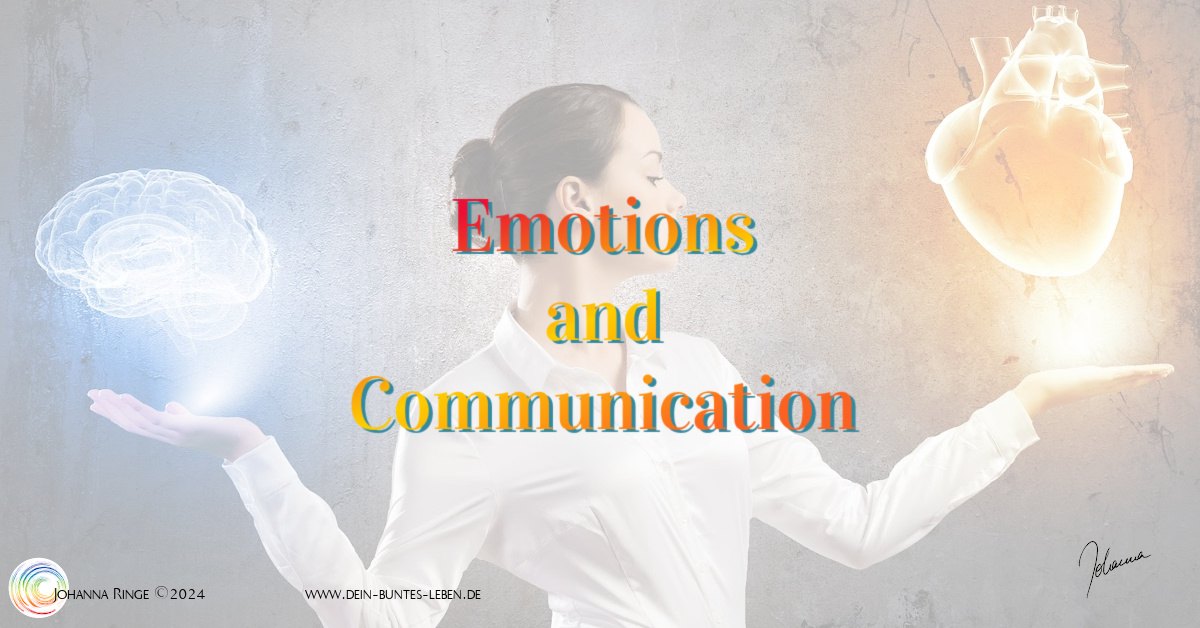Three is a crowd, and communication is a matter of luck. I do not even want to discuss the former, but communication is something you can learn. However, it tends to get complicated when emotions mingle with communication.
Both, emotions and communication, are as essential to human life as breathing.
If a person, whose intellect presumably even lies above average, persistently interprets the words of their counterpart in a conversation illogically or incorrectly, with the expected consequences, one of two cases is probably true: either they are highly emotional right now, or they are simply not interested in the success of the communication. In the first case, the only option is to retreat and wait for more tranquil times.
No matter how intelligent we are, how logical our thinking, or how practised our mind control, every strong emotion has an influence on how our mind works.
I do not want to use the infamous sabre-toothed tiger, but rather an example from road traffic: if I, as a driver, notice that someone is coming too fast at me from the side street, my foot has to land heavily on the accelerator pedal without me even thinking about it. Another example: if a small child falls into the pool, I have to jump without searching for a bookmark or taking off my shirt first.
Fear, joy, anger, or shock – emotions take precedence over thoughts.
(This topic makes you realise we humans are just animals, in many ways.) Emotions always welcome motor responses, so an intense discussion makes us jump up, pace, and gesticulate wildly. Ideally, everyone involved will realise that they are emotional, express that and postpone the discussion or find another solution. Sometimes going on a walk together is the best we can do. In the worst case, however, there are outbreaks of physical violence.
When strong convictions are paired with strong emotions…
On every topic you will find as many opinions as people thinking about it, or more. In general, we tend to cluster with kindred spirits and try to avoid the others. This is good thinking. But, sometimes, quite often, we must interact with people who have different values and opinions. That can be quite demanding and the more relaxed and grounded we remain, the better. But each and every one of us has their own triggers that make us react very emotional.
… then successful communication is nearly impossible.
“Neither politics nor religion at the table!” That is incredibly wise as a rule not only for the big family gatherings but in general for everyone’s digestion. Because politics and religion are always about values, about the very foundations of our view of the world and of our fellow human beings. And these two topics aren’t the only difficult ones: relationships of every kind, how we treat each other, what is your preferred social construct -whenever we talk about these, we are emotional. Whether a conversation about these will get us any further, definitely depends on the ability of those involved to regulate their emotions.
How do we want to interact – an emotional question.
Whether it is a question of how we treat each other at home, the mood at work, the behaviour of an entire nation or the self-imposed rules in any community of interest, in each of these cases it is always about finding a consensus. We want to find a definition that is acceptable to everyone involved. Or at least tolerable. So it has to include all the relevant values of all the people involved.
At this point you realise that this is actually an impossibility if the group was randomly thrown together or simply too large.
As gregarious animals we humans must belong to a group, but often we have to look for a very long time until we find a social construct in which our personal values are relevant. If we are not able or not willing to search for a long time we will have to compromise. (And have our emotions pretty well under control during negotiations and discussions.)
If we can’t compromise, this group is not for us, we must search for another one.
This will frustrate us, overwhelm us with emotions, and the communication with that first group will be impossible. Or, more accurate, successful communication will be improbable. (This then leads to the second case in the second paragraph above. There is no longer any interest in successful communication.)
The only thing that really helps both sides here is to gain distance and practice self-care. And then go in search of people who share our values.
The better we know our values and our moral concepts, the better we can evaluate where we might belong.
And the more authentic and sincere we move through this world, the faster we will be recognised and found by those who seek us. This might take courage and strength, I know, but much less strength then having to constantly bend and adapt.
For me, good communication doesn’t mean just compromising with others, gently whispering.
Good communication includes our emotional interactions, our mental exchanges, our relationship management and the more playful discussion of completely unrelated issues.
(and so much more…)
Our juggling of emotions and communication will be successful as long as we are aware of the different strata of communication and focus on the success of our chosen social construct rather than our own short-term advantage.
Heartfelt, happy juggling, wherever you are,



Three is a crowd, and communication is a matter of luck. I do not even want to discuss the former, but communication is something you can learn. However, it tends to get complicated when emotions mingle with communication.
Both, emotions and communication, are as essential to human life as breathing.
If a person, whose intellect presumably even lies above average, persistently interprets the words of their counterpart in a conversation illogically or incorrectly, with the expected consequences, one of two cases is probably true: either they are highly emotional right now, or they are simply not interested in the success of the communication. In the first case, the only option is to retreat and wait for more tranquil times.
No matter how intelligent we are, how logical our thinking, or how practised our mind control, every strong emotion has an influence on how our mind works.
I do not want to use the infamous sabre-toothed tiger, but rather an example from road traffic: if I, as a driver, notice that someone is coming too fast at me from the side street, my foot has to land heavily on the accelerator pedal without me even thinking about it. Another example: if a small child falls into the pool, I have to jump without searching for a bookmark or taking off my shirt first.
Fear, joy, anger, or shock – emotions take precedence over thoughts.
(This topic makes you realise we humans are just animals, in many ways.) Emotions always welcome motor responses, so an intense discussion makes us jump up, pace, and gesticulate wildly. Ideally, everyone involved will realise that they are emotional, express that and postpone the discussion or find another solution. Sometimes going on a walk together is the best we can do. In the worst case, however, there are outbreaks of physical violence.
When strong convictions are paired with strong emotions…
On every topic you will find as many opinions as people thinking about it, or more. In general, we tend to cluster with kindred spirits and try to avoid the others. This is good thinking. But, sometimes, quite often, we must interact with people who have different values and opinions. That can be quite demanding and the more relaxed and grounded we remain, the better. But each and every one of us has their own triggers that make us react very emotional.
… then successful communication is nearly impossible.
“Neither politics nor religion at the table!” That is incredibly wise as a rule not only for the big family gatherings but in general for everyone’s digestion. Because politics and religion are always about values, about the very foundations of our view of the world and of our fellow human beings. And these two topics aren’t the only difficult ones: relationships of every kind, how we treat each other, what is your preferred social construct -whenever we talk about these, we are emotional. Whether a conversation about these will get us any further, definitely depends on the ability of those involved to regulate their emotions.
How do we want to interact – an emotional question.
Whether it is a question of how we treat each other at home, the mood at work, the behaviour of an entire nation or the self-imposed rules in any community of interest, in each of these cases it is always about finding a consensus. We want to find a definition that is acceptable to everyone involved. Or at least tolerable. So it has to include all the relevant values of all the people involved.
At this point you realise that this is actually an impossibility if the group was randomly thrown together or simply too large.
As gregarious animals we humans must belong to a group, but often we have to look for a very long time until we find a social construct in which our personal values are relevant. If we are not able or not willing to search for a long time we will have to compromise. (And have our emotions pretty well under control during negotiations and discussions.)
If we can’t compromise, this group is not for us, we must search for another one.
This will frustrate us, overwhelm us with emotions, and the communication with that first group will be impossible. Or, more accurate, successful communication will be improbable. (This then leads to the second case in the second paragraph above. There is no longer any interest in successful communication.)
The only thing that really helps both sides here is to gain distance and practice self-care. And then go in search of people who share our values.
The better we know our values and our moral concepts, the better we can evaluate where we might belong.
And the more authentic and sincere we move through this world, the faster we will be recognised and found by those who seek us. This might take courage and strength, I know, but much less strength then having to constantly bend and adapt.
For me, good communication doesn’t mean just compromising with others, gently whispering.
Good communication includes our emotional interactions, our mental exchanges, our relationship management and the more playful discussion of completely unrelated issues.
(and so much more…)
Our juggling of emotions and communication will be successful as long as we are aware of the different strata of communication and focus on the success of our chosen social construct rather than our own short-term advantage.
Heartfelt, happy juggling, wherever you are,